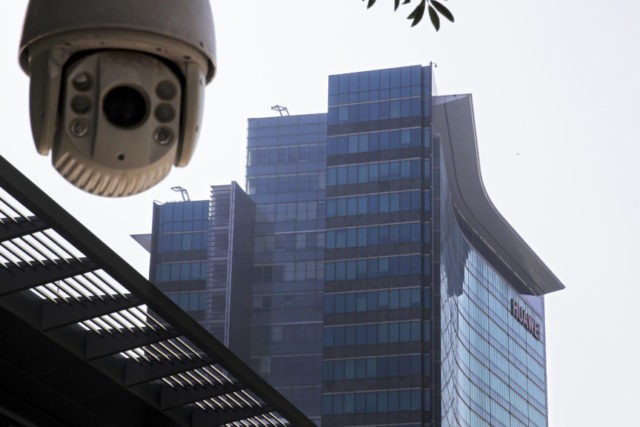China enlisted its telecommunications giant Huawei to build Ecuador’s former socialist President Rafael Correa a replica of its sprawling national surveillance system, helping him monitor dissidents and protect his government, the New York Times revealed on Wednesday.
Current Ecuadorian President Lenin Moreno – who has dedicated his tenure to undoing Correa’s radical leftist legacy despite being elected as a member of Correa’s party – gave the Times an inside look at “ECU-911,” a network of 4,300 Chinese-built cameras around the country that help the government’s intelligence services monitor citizens. The network’s overt use is to fight crime and catch criminal suspects, but the Times notes that its totalitarian nature allows for monitoring anyone the government views as a threat.
Moreno, who has also presided over legal proceedings that resulted in an arrest warrant for the Belgium-based Correa, appears to have opened up Ecuador’s intelligence apparatus to the Times to facilitate its reform. Moreno shut down the agency running ECU-911 in March 2018 and transferred it to another domestic intelligence unit while his government investigates the former National Secretariat of Intelligence (Senain).
The New York Times received a glimpse into the system and reported it takes 3,000 government employees working out of 16 monitoring centers to oversee every government camera in the country. They have access to footage of all cameras, mostly placed in public, and can replay the events of nearly every time and place in the country.
“Armed with joysticks, the police control the cameras and scan the streets for drug deals, muggings and murders. If they spy something, they zoom in,” the newspaper notes.
The cameras are meant to be used to catch criminals but, under Correa, the government was keen to redefine who counts as a criminal. Correa – an ally of Venezuela’s Hugo Chávez – aggressively attempted to shut down dissident media and regularly threatened those opposed to his socialist ideology. Ironically, his final threat as president against dissidents was to overturn the results of the 2017 presidential election if voters did not choose Lenin Moreno. Ecuador has an arrest warrant out on him for allegedly paying criminals to kidnap opposition members.
Correa opened his country’s doors to Huawei and the Chinese Communist Party-operated C.E.I.E.C. (China National Electronics Import & Export Corporation) in what the New York Times noted as a no-bid process, making it impossible for other companies to offer more affordable security options. Correa paid for the lucrative system in oil, the newspaper claims, tying the system to the reason Moreno’s government has a warrant out for Correa’s arrest: his refusal to testify in a case investigating how China made billions off of Ecuador’s vast oil reserves.
Moreno opened an investigation into why the country had signed a significant number of oil deals with China and if Quito had more lucrative options. In October 2018, Ecuador’s Prosecutor General unveiled a report finding that, under Correa, Ecuador lost $2 billion in oil profits. Correa made deal after deal with Chinese regime oil companies at much lower prices than what that oil would have sold for in the free market, the report revealed.
Following the publication of the Times report on Wednesday, Ecuadorian Minister of the Interior María Paula Romo insisted that the successor agency to Senain, the Center for Strategic Intelligence, did not operate the way Senain did and those who oppose Moreno’s government have nothing to fear.
“The government dissolved the Senain, these practices don’t happen in Ecuador anymore. I mean the practice of political policing or monitoring where people are, of interfering in their communications, of publishing people’s private information,” Romo said.
The relationship China developed with Correa, which appears to have significantly impoverished Ecuador, is a prime example of how China has used its technology arms to trade safeguards for authoritarian-inclined leaders for their nation’s sovereignty. The Ecuador example is similar but more obscure than that of its neighbor, Venezuela, where total economic collapse has made China more important than ever.
Under current dictator Nicolás Maduro, the Times notes that Venezuela operates the same camera system as Ecuador. The newspaper lists Bolivia, Zimbabwe, Uzbekistan, Pakistan, Kenya, the United Arab Emirates, and Germany as other nations who have bought into the surveillance mechanisms. Yet Venezuela has gone a step further, reportedly purchasing a pilot export program of China’s “social credit system.” China uses surveillance technology to track the behavior of every last citizen, assigning them a numerical “score” based on how much the Communist Party approves. Anti-government dissidence is at the top of the reasons for a low score, but littering, public religious displays, and rudeness on public transportation could also affect it. A low score prevents citizens from buying plane tickets, using public transportation, and participating in society in other yet-unspecified ways.
In Venezuela, Maduro intends to use the ration card – the “Fatherland Card” – to control Venezuelans’ purchases of food, water, fuel, and medicine. Reports suggest that, using the Chinese system, Maduro will be able to block Venezuelan individuals he disapproves of from eating or receiving healthcare, among other services.

COMMENTS
Please let us know if you're having issues with commenting.